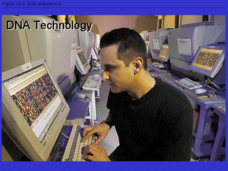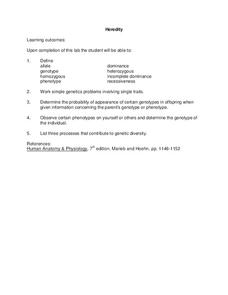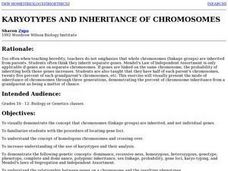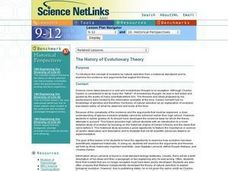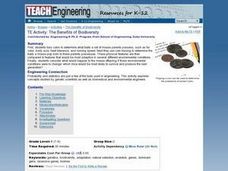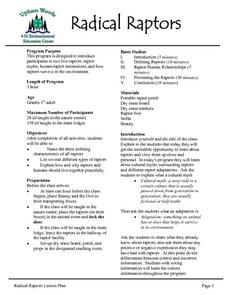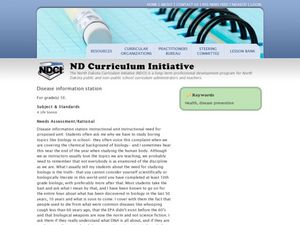LABScI
Taxonomy: Who is in My family?
Find similarities in seemingly unlike organisms. The second instructional activity in a series of 12 builds the concept of a taxonomy and explores the use of a dichotomous key. Learners begin in part one by attempting to group a set of...
Channel Islands Film
Island Cattle Ranching
Is cattle ranching on Santa Rosa island viable or non-viable? Rather than focusing on the issues of the transition of Santa Rosa island from a privately owned island cattle ranch to a national park, class members are asked to consider if...
Curated OER
Special Products
Looking for a activity on special products of binomials? This one-page document includes two separate assignments on special products. Problems include multiplying binomials in the form (a+b)^2,(a-b)^2,(a + b)(a -b), as well as a few...
Curated OER
DNA Technologies
After giving some of the basic characteristics of the DNA molecule, the slides provide process information and many detailed diagrams about plasmids, vectors, and their application in cloning genes.
Curated OER
Pea Plants Dihybrid Cross
In this dihybrid cross learning exercise, students are given four crosses to complete using punnett squares. They determine the genotypic and phenotypic ratios of the offspring.
Curated OER
A Mendel Seminar
Students analyze Gregor Mendel's discovery of a process of biological evolution. They also explore how recessive and dominant traits are passed from one generation of living organisms to the next. This lesson involves environment...
Curated OER
Heredity
In this science worksheet, middle schoolers find the answers to various types of heredity problems. They use the sheet to set goals for completing the unit.
Curated OER
Human Evolution
Students investigate hominid evolution to learn the difference between a relative and an ancestor. They study the emergence of bipedalism and the related physical adaptations and cultural ramifications, and chart patterns of hominid...
Michigan Sea Grant
Fish Identification
Using a dichotomous key, pupils identify characteristics of fish who live in the Great Lakes and explain how these features help them survive. In small groups, class members discover what features scientists consider important and...
Curated OER
Dihybrid Cross Punnett Squares
In this dihybrid cross activity, students complete two punnett squares for the cross of two traits. They determine the genotypes, phenotypes and phenotypic ratios of the offspring.
Curated OER
Freshwater Sharks Bite Children at 35th Beach. A Play
Students delve into a study of sharks. In this science lesson plan, students examine the many different scientific occupations, as well as some possible specializations therein, and perhaps a little bit of other life considerations,...
Curated OER
DNA Detectives
Fifth graders define dominant and recessive genes and that they have DNA from their mother and father. In this inherited traits lesson plan, 5th graders complete a punnet square based on their parents traits. Students decorate their...
Curated OER
Karyotypes and Inheritance of Chromosomes
Students explore the mode of inheritance of chromosomes. Given a scenario, students use the Human Genome sheet to determine inherited chromosomes. They illustrate the difference between genotype and phenotype. Students develop a model...
Curated OER
Cancer Risks
Learnersbrainstorm ideas about Cancer and its couses. They read an article which describes communities in the United States that have been affected by high rates of cancer and information which describes hereditary factors that...
Curated OER
Sex-Linked Genes and Disorders
In this genes learning exercise, students determine how the gender of a baby is produced plus explore sex-linked disorders such as hemophilia. This learning exercise has 20 fill in the blank and 8 short answer questions.
Curated OER
The History of Evolutionary Theory
Learners are introduced to the concept of evolution by natural selection from a historical standpoint. They examine the evidence and arguments that support the theory of natural selection.
Curated OER
Microarrays: Chipping Away at the Mysteries of Science and Medicine
High schoolers research microarrays on the internet in cooperative groups. Students write an essay describing the use of microarrays in environmental research and in medicine.
Curated OER
The Benefits of Biodiversity
Students examine the concept of biodiversity. They toss coins to determine what traits mouse parents have and the babies traits as well. They predict what would happen to the baby mice if the traits of the parents were different.
Curated OER
Radical Raptors
Students are introduced to raptors and their role in the environment. They identify three characteristics of raptors and list several types of raptors found in nature. They discuss their positive and negative experiences with raptors and...
Curated OER
Case of the Threespine Stickleback
Students examine why some freshwater populations of stickleback fish. In this macroevolution instructional activity students read a study packet then answer questions.
Curated OER
Intermediate Sentence Completion Exercise 35
In this intermediate sentence completion exercise 35 worksheet, students working online, choose the correct word(s) to complete the sentence, with immediate feedback.
Curated OER
The Short Answer
Students examine the discovery of the Flores man. In this anthropology lesson, students discover details about the Flores man and the work of anthropologists. Students are challenged to create their own stories that explain Flores man.
Curated OER
Is Your Home Bugging You?
Students look into the world-wide rise in allergy rates. For this personal health lesson, students research and discuss possible reasons for the spike in allergies.
Curated OER
Disease Information Station
Tenth graders study disease and how it changes normal body functions. In this research lesson students research a disease and use a word processing software to construct a presentation.
Other popular searches
- Genetics Probability Penny
- Biology Genetics Probability
- Genetics Probability Coin
- Probability and Genetics
- Probability Genetics
- Probability in Genetics





